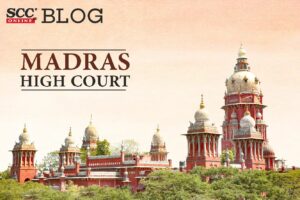Madras High Court: A Division Bench of V. M. Velumani and S. Sounthar, JJ. granted divorce as sought by the appellant-husband on grounds of mental cruelty as the wife suspected the character of the appellant-husband and used filthy language in front of his colleagues and students and also alleged for having extra marital affair with his colleague without being able to provide any substantial evidence corroborating the same.
The appellant husband sought for divorce on the ground of mental cruelty before the Family Court which was dismissed as the appellant failed to prove mental cruelty. Aggrieved by the same, present appeal was filed under Section 19 Family Court Act. The appellant alleged that the respondent/wife developed suspicion about the appellant’s conduct and character and humiliated him by connecting him with his female colleagues. A false complaint was preferred by respondent/wife against appellant/husband before Thiruchengodu All Women Police Station and further tarnishing the image of the appellant came to his work-place and used filthy languages and spoke ill of him by connecting him with other female lecturers and as all his attempts for reunion resulted in failure hence, he was constrained to file divorce petition on the grounds of cruelty.
Reliance was placed on A Jayachandra v. Annel Kaul, (2005) 2 SCC 22 to observe that suspecting the character of other spouse and making complaint to police would certainly amount to mental cruelty, when it is not substantiated by any evidence. The Court noted that in the case on hand, the respondent herself admitted that she did not know the name of the lady with whom the appellant was allegedly having illegal intimacy. Thus, she assumed illegal intimacy only because appellant used to talk with his female colleagues over cell phone. Hence, the doubt created in the mind of respondent is nothing but an assumption without any reasonable basis.
Further reliance was placed on Anusha v. Arjun, (2017) 5 LW 165 wherein it was observed that “the fact remains that the appellant went to the workplace of the respondent on the relevant day and she also apologized for what has happened by way of an e-mail to the respondent. This incident, undoubtedly, would have developed a deep scar in the mind of the respondent. While that be so, we hold that the respondent has established that he was subjected to cruelty at the hands of the appellant.”
Placing further reliance on K Srinivas Rao v. D A Deepa (2013) 5 SCC 226 and Narendra v. K Meena (2016) 6 CTC 440 observed that the respondent /wife caused mental cruelty to husband by suspecting his character and making false allegations of extra marital affair in the presence of his colleagues and students and also before the police.
With regard to one of the contention made by the counsel for the appellant regarding removal of thali chain (mangalsutra) at the time of separation by the wife shows her intention to dissolve the marriage, the Court relied on judgment Vallabhai v. R Rajasabhi (2017) 1 MWN (Civil) 128 and categorically noted that though removal of thali chain per se insufficient to put an end to the marital knot, but the said act of respondent is a piece of evidence in drawing an inference about the intentions of the parties. Thus, the act of removal of thali chain at the time of separation coupled with various other evidence available on record, concludes that the parties have no intention to reconcile and continue the marital knot.
As the appellant and the respondent are living separately from 2011 onwards and there was no evidence available on record to show that respondent made any attempt for reunion during this period, thus, the Court granted decree of divorce dissolving the marriage as the actions alleged by the appellant husband amounts to mental cruelty within the meaning of Section 13(i)(a) Hindu Marriage Act, 1955.
[C. Sivakumar v. A. Srividhya, 2022 SCC OnLine Mad 3672, decided on 5-07-2022]
Advocates who appeared in this case :
For the Appellant : Senior Adv. S. Subbiah;
For the Respondent : Adv. S. Vijayaraghavan.
*Arunima Bose, Editorial Assistant has reported this brief.

